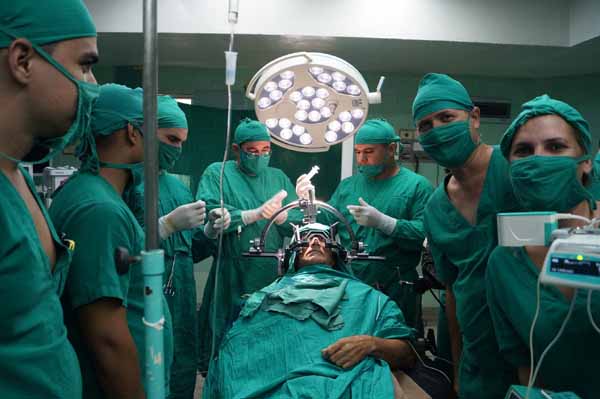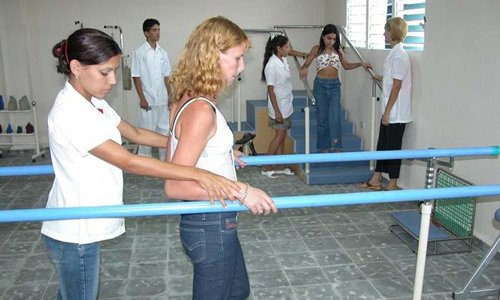STROKE RECOVERY, ALZHEIMER, PARKINSON'S, CEREBRAL PALSY TREATMENT IN CUBA
LATEST NEWS:
Brain surgery for Parkinson patients

Twenty Cuban patients with Parkinson's disease underwent deep brain stimulation surgery. Minimum access technique, considered among the stereotactic methods to attend patients with this condition, allows to reach deep structures of brain, select altered nucleus and act on it to improve clinical symptomatology. In this type of operation, which has several surgical targets for the treatment of Parkinson, the symptoms and signs of the disease, such as stiffness and involuntary tremors, remarkably disappear in each patient during and after surgery. The clinical manifestations of the disease and the functional capacity of the patient can be controlled in more than 90 percent through this procedure.
This type of minimum access surgery is executed in Latin America only in Cuba, Brazil, Mexico and Argentina. In these last three nations, each patient must pay about 150 000 dollars, but for Cubans, although each operation costs for the state approximately $ 50 000, it is totally free.
Havana Neurology and Neurosurgery Institute continues to improve in comprehensive treatment and specialized attention of neurological-degenerative illness.
The challenges for the center include development of diagnostic technology for neurological ailments through MRI with the construction of a high camp equipment and strengthen a comprehensive attention of patients with epilepsy, movement disorders and neuro-muscular ailments. As well as neurological stimulation and neurological modulation techniques in diseases of the central nervous system and the treatment of pain, among others.
Institute's main impacts are related with the following research topics: epidemiology in neurological ailments (Parkinsons, Alzheimer, Guillain-Barre, epilepsy, vascular diseases and brain tumors).
Institute develops new methods for the prenatal molecular diagnosis and carriers of severe neurological diseases (spine and muscular atrophy); epidemic neuropathy (optic and peripheral) hyperthyroidism, dementia and the study of neurological psychology in neurological genetic ailments.
 The International Center for Neurological Restoration (CIREN) has treated 120,000 patients from 93 countries, including Cuba and has gone on front-runner in the field of neuroscience. It also has a program of intensive multifactorial Neurological Restoration, which combines basic, clinical, medical diagnosis, treatment, rehabilitation and surgery; and enhances the chances of recovery of the patient. Pointer in Latin America and worldwide impact on the study of movement disorders and Parkinson's treatment in epilepsy and dystonia in CIREN experts inquire about cerebral palsy in children, autism, stroke, head trauma and spinal damages, Cerebellar Ataxia, among other ailments. A multidisciplinary team led by neurologist and composed of about 13 specialties, care for the patient seven hours daily, Monday to Saturday, intensive and personalized manner.
The International Center for Neurological Restoration (CIREN) has treated 120,000 patients from 93 countries, including Cuba and has gone on front-runner in the field of neuroscience. It also has a program of intensive multifactorial Neurological Restoration, which combines basic, clinical, medical diagnosis, treatment, rehabilitation and surgery; and enhances the chances of recovery of the patient. Pointer in Latin America and worldwide impact on the study of movement disorders and Parkinson's treatment in epilepsy and dystonia in CIREN experts inquire about cerebral palsy in children, autism, stroke, head trauma and spinal damages, Cerebellar Ataxia, among other ailments. A multidisciplinary team led by neurologist and composed of about 13 specialties, care for the patient seven hours daily, Monday to Saturday, intensive and personalized manner.
CIREN has created a new technology for the neuro-restorative, intensive, personalized and specialized teamwork treatment, based on neuro-plasticity principles to achieve a structural and functional recovery of the lesioned nervous system. It is applied by highly qualified medical teamworks in 7-specialized clinics according to diseases, through therapeutic actions integrally designed for each patient up to 7 daily hours under a neurologist's guidance.
NEUROLOGICAL RECOVERY
It is a therapeutic strategy that combines pharmacological, surgical and neurorehabilitating methods, based on properties of recovery of the Nervous System. It allows to compensate existing alterations and to stimulate the structural and functional restoring of the injured nervous activity.
Its universe of application referes to those patients affected with invalidating diseases of the Nervous System. Though a previous patient's application is required by email. CIREN's Medical Scientific Group approves those patients that would be admitted as participants of this program. This program has 2 stages or phases:
A first evaluation stage, up to 7 days. A whole neurological and clinical evaluation is performed where the degree and type of affectation is thoroughly defined by offering a diagnosis that allows to conclude what therapeutic possibilities to use. The potentiality of recovery is determined and the personalized treatment is thus designed to be proposed to the patient. Evaluation stage average cost until recently was 3616 CUC. The second stage is putting the therapeutic program into practice specially conceived for each patient based on the results of the evaluation and with a minimum duration of 28 days. The therapeutic 4 weeks average cost until recently was 7400 CUC.
The second stage is putting the therapeutic program into practice specially conceived for each patient based on the results of the evaluation and with a minimum duration of 28 days. The therapeutic 4 weeks average cost until recently was 7400 CUC.
For its therapeutic stages, the Program is developed into 4-week cycles (28 days), each one with own objectives for recovery, through the application of the intensive, multidisciplinary treatment of neurologic rehabilitation, up to 7-daily hours, under the direction of a neurologist. This program is conducted in one out of the four specialized clinics in relation to the case's pathology. Would it be necessary, the option of surgical approach could be thus added.
In both phases, a highly specialized professional team, including neurologists, neurosurgeons, clinicians, pediatricians, geriatrists, neurophychologists, specialists in physical neuro-rehabilitation, occupational therapists and logophonetricians and neurologic nursing, among others, all promoted through a rigurous academic selection. The Program offers economic tariffs as to the exclusivity and excellency of the medical service that is being offered.
EVALUATION
In a general way, the evaluation period of the Neurologic restoration Program includes severall tests that are indicated according to the individual clinical status of each patient, as follows:
Integral Neurophysiology
Evoked Potentials
Motor Potentials
Electromyograms
Studies of nervous conduction
Electroencephalograms
Imagenology
Magnetic Resonance
Axial Tomography
Brain SPECT
Simple X-R of articulations
Thorax X-R
Clinical Lab
Hemacytometry
Hemochemical
Hormone studies
Immuno-histochemical
Central and Peripheric Neuroimmunology
Specialized Bio-Chemistry
Pathologic Anatomy
Motor Instrumental Evaluation
Pharmacologic Tests
Automated Nutricional Evaluation
Specialized Clinics of the Program are:
Clinic of Movement Disorders and Neurodegenerations
Clinic of Rachimedullar lesions, Neuromuscular Diseases and Multiple Sclerosis
Clinic of Static Encephalic Lesions
Clinic of Neurology for Children
CLINIC OF NEUROMUSCULAR DISORDERS, RACHIMEDULLAR LESIONS AND MULTIPLE SCLEROSIS DISEASES AND SEQUELS
Paraplegias and quadriplegias caused by traumatic lesions of the spinal cord
Sequels of vascular lesions (infarcts and hemorhages) of the spinal cord (myelomacy or hematomyelia)
Transverse myelitis (nonimmune myelopathies or post-infections and vaccinal ones)
Nutritional myelopathies
Sequels of medullar tumors
Multiple Sclerosis and other demyelinating diseases
Nutritional polyneuropathies, diabetic and demyelinating ones
Myopathies or muscular diseases (muscular deptrophies and spinal atrophies)
Secondary spastic paraparesia to infections (Tropical by HTVL1 and HTLV2)
Hereditary spastic paraparesia
Sequels of Medullar lesions to Syringomelias and Spondolitic Myelopathies.
About 100 patients with disorders and spinal cord sequels, that is, the so-called rachimedullar injuries are mainly caused by automobile accidents, immersion in shallow waters with cervical trauma as result falls and shots are among the most frequent one. The Center also receives patients with sepsis sequels or infection of the nervous system, alterations due to tumoral lesions that have been totally eradicated through surgery, posterior lesions or other type of surgeries, or myelopathies as a degenerative, toxic, demyelinating or nutritional disease. A no less important group of patients with neuromuscular disorders, neuropathies and muscular dystrophies are also received at our Center. Besides, it also dedicates itself to demyelinating diseases among them Multiple Sclerosis specially.
CIREN's medical- scientific group have a wide expertise and are highly specialized in the study and treatment of these diseases and sequels all conducted within a multidisciplinary management- composed of specialists in Neurology, Internal Medicine, Speech Therapy, Physical Rehabilitation or kinesiology and neuropsychology. The Clinic also has possibilities of evaluating and offering Urology Treatment, techniques in Traditional Medicine, Neurosurgery and Biophysics Stimulation. All professionals are under the guidance of an specialist in Neurology. A week of evaluation, that permits confirming diagnosis, identification of deteriorating signs and disorders as well as other diseases that could interfere with the patient's rehab and health. This would be the first week of the General Program of Neurologic Restoration: informing the patient of the results of his/her diagnosis and prognosis available; besides offering adequate pharmacological and neurorestorative treatment conducted in 28-day cycles. For Restoration Program is applied to the patient in an intensive way permitting to obtain important achievements in his/her recovery in spite of serious neurologic affectations. This is one most requested CIREN's Clinics by patients of several countries that come to benefic themselves of the Clinic's experienced services seeking for greater independence in daily life activities and improvement in their quality of life.

CIREN's present infrastructure includes 30 double-rooms with independent baths prepared to respond to the necessities required by this type of patients, distributed in 3 wards at CIREN's Clinical Area.
